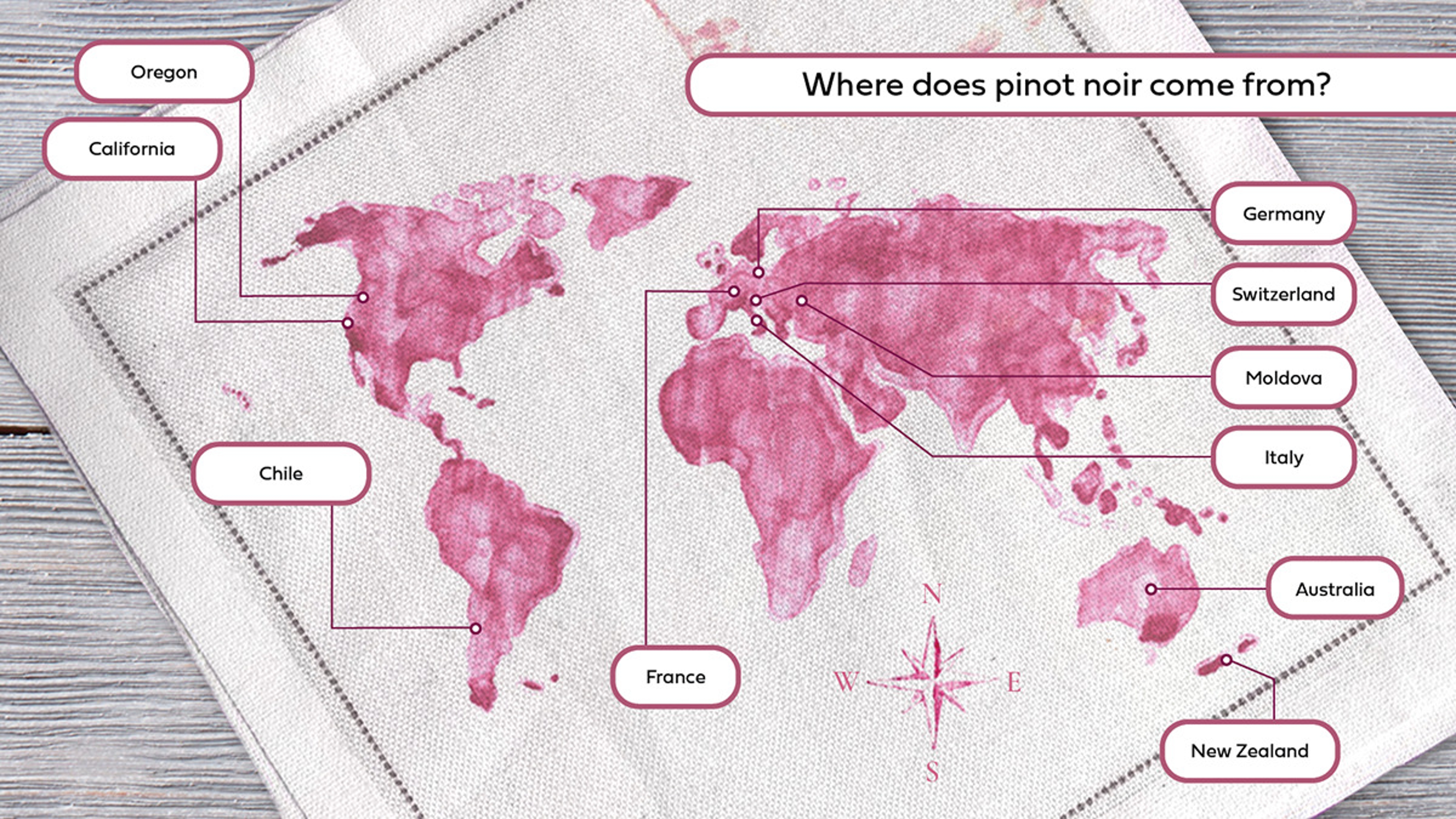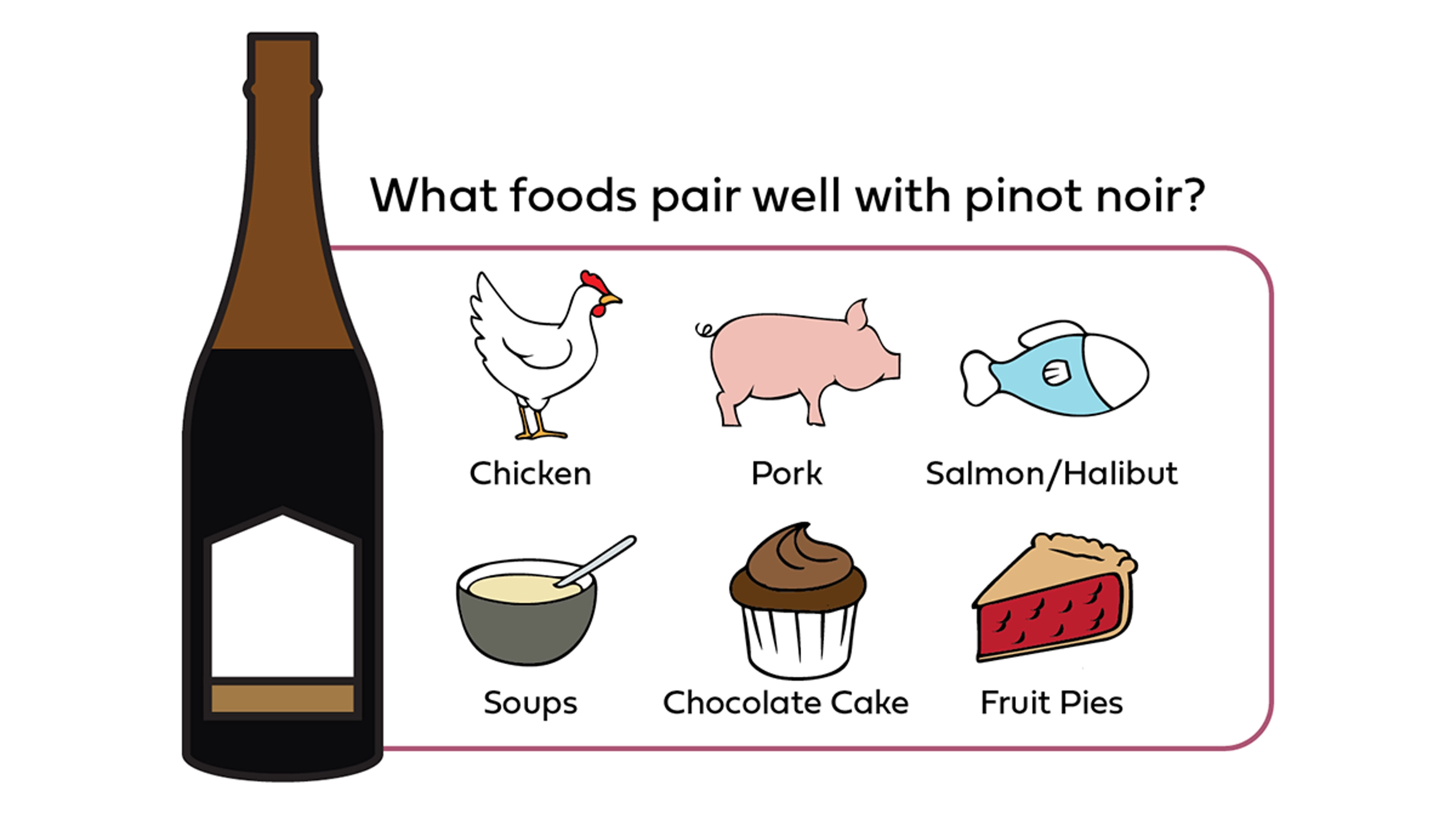A Wine Lover's Guide to Enjoying Pinot Noir
Pinot noir is one of the most popular wines in the world and pairs gloriously with the best that savory and sweet has to offer.
May 04, 2023
If cabernet sauvignon is the king of red wine grapes, then pinot noir is its fussy younger sibling. Whereas the former is produced in large quantities worldwide and can be grown virtually anywhere, the latter isn't quite comfortable unless conditions are perfect. But when they are, pinot noir can be considered some of the finest — and, in turn, most expensive — wines in the world.
Where does pinot noir come from?
Pinot noir is a thin-skinned red wine grape most commonly grown in Burgundy, France. It is the dominant red grape varietal of the region, with over 26,000 acres planted. Elsewhere throughout France, the grape thrives in Champagne, the Loire Valley, and Alsace.
Pinot noir is widely planted (over 240,000 acres!) in other wine-producing countries, including Australia, Chile, Germany, Italy, Moldova, New Zealand, and Switzerland. But it truly thrives in the unique micro-climates of coastal California and Oregon, where cool, foggy mornings help protect the grapes' delicate skins from the harsh sun.

What does pinot noir taste like?
A well-made pinot noir has a light to medium body, low tannins, and bright, fresh acidity. The dominant flavors can vary depending on the region where it is grown. For instance, in warmer climates like Sonoma County, California, flavors range from ripe strawberry to baked cherry with subtle hints of rocky soil.
In cooler climates, such as Burgundy and Oregon, pinot noir leans more toward flavors like cranberry, raspberry, and Bing cherry, with more pronounced secondary characteristics like mushroom, black truffle, and forest floor layered underneath. The French call this sous bois ("sue bwah"), meaning the wine has an aromatic essence of a forest. But don't worry: You won't find any actual leaves or tree bark in the wine.
4 questions about pinot noir with chef Geoffrey Zakarian

Harry & David brand ambassador Geoffrey Zakarian knows a thing or two — or thousands, actually — about wine. Pinot noir is one of his four favorite wines so we asked him about the basics.
What do you like about pinot noir?
This is made with a lighter grape that is more delicate. It has a great berry flavor. For people who don’t drink red wine, I always introduce them to it with pinot noir. It’s sort of a gateway to the larger wines like cabernet sauvignon.
Pinot noir also has a lot of utility and can be paired with a wide array of dishes.
What are some of those dishes?
It really goes nicely with red meat, poultry, and even fish.
Best type of glass?
A glass that has a bottom that’s fatter than the top – it really accentuates all the nose, and the smell comes right out of the top of that glass. But an all-purpose does the job if that is what you have.
What’s the best temperature to drink it at?
I like it served at 55 degrees, slightly cooler than cellar temperature, which is 59 degrees.
What foods pair well with pinot noir?
When it comes to food pairing, pinot noir is one of the most versatile red wines in the world. Its flavor profile of light red fruits are a natural match for lighter proteins, such as a hickory-smoked whole roasted chicken, stuffed pork loin, or pork roast.
Pinot noir is also one of the best red wines to pair with certain seafood. The wine's medium body, low alcohol content, and soft tannins integrate perfectly with the subtle flavors and flaky texture of a sockeye salmon or Alaskan halibut, while its mushroom-tinged earthy finish make it a great match for seafood soups, such as salmon chowder, seafood bisque, or spicy cioppino.

Pinot noir can even be paired with a number of different desserts, such as chocolate decadence cake or a chocolate mousse cheesecake. Here, the wine acts like a tart raspberry sauce that helps cut through the richness of the icing and chocolate. With chocolate covered berries, a cherry galette, or peach and blueberry pie, the delicate flavors of the pinot don't overpower the tartness of the fruit, or the flaky buttery crust, allowing the best elements from both the wine and the dessert to shine through.
Don't limit yourself to only these suggestions, however. The combination of a light-bodied, fruit-forward wine like pinot noir with tart and tangy desserts creates a delicious and refreshing contrast that is hard to resist.
Guide to Wine
Learn about different wine varietals with our easy to follow guides.
Learn about different wine varietals with our easy to follow guides.
.svg?q=70&width=384&auto=webp)














